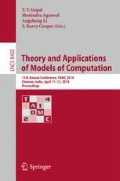Abstract
The algorithm to compute prime implicates and prime implicants in modal logic \({\mathcal{K}}\) has been suggested in [1]. In this paper we suggest an incremental algorithm to compute the prime implicates of a knowledge base KB and a new knowledge base F from Π(KB) ∧ F in modal logic \({\mathcal{K}}\), where Π(KB) is the set of prime implicates of KB and we also prove the correctness of the algorithm.
Access this chapter
Tax calculation will be finalised at checkout
Purchases are for personal use only
Preview
Unable to display preview. Download preview PDF.
References
Bienvenu, M.: Prime implicates and prime implicants: From propositional to modal logic. J. Artif. Intell. Res. (JAIR) 36, 71–128 (2009)
Bienvenu, M.: Consequence Finding in Modal Logic. PhD Thesis, Universit Paul Sabatier (May 7, 2009)
Cook, S.A.: The complexity of theorem-proving procedures. In: Proc. 3rd ACM Symp. on the Theory of Computing, pp. 151–158. ACM Press (1971)
Cadoli, M., Donini, F.M.: A survey on knowledge compilation. AI Communications-The European Journal for Articial Intelligence 10, 137–150 (1998)
Coudert, O., Madre, J.: Implicit and incremental computation of primes and essential primes of boolean functions. In: Proceedings of the 29th ACM/IEEE Design Automation Conference, pp. 36–39. IEEE Computer Society Press (1991)
Darwiche, A., Marquis, P.: A knowledge compilation map. Journal of Artificial Intelligence Research 17, 229–264 (2002)
Jackson, P., Pais, J.: Computing prime implicants. In: Stickel, M.E. (ed.) CADE 1990. LNCS, vol. 449, pp. 543–557. Springer, Heidelberg (1990)
Kean, A., Tsiknis, G.: An incremental method for generating prime implicants/implicates. J. Symb. Comput. 9(2), 185–206 (1990)
de Kleer, J.: An assumption-based tms. In: Ginsberg, M.L. (ed.) Readings in Nonmonotonic Reasoning, pp. 280–297. Kaufmann, Los Altos (1987)
de Kleer, J.: An improved incremental algorithm for generating prime implicates. In: Proceedings of the Tenth National Conference on Artificial Intelligence, AAAI 1992, pp. 780–785. AAAI Press (1992)
Ngair, T.H.: A new algorithm for incremental prime implicate generation. In: Proc. of the 13th IJCAI, Chambery, France, pp. 46–51 (1993)
Raut, M.K., Singh, A.: Prime implicates of first order formulas. IJCSA 1(1), 1–11 (2004)
Reiter, R., de Kleer, J.: Foundations of assumption-based truth maintenance systems. In: Proceedings of the Sixth National Conference on Artificial Intelligence (AAAI 1987), pp. 183–188 (1987)
Shiny, A.K., Pujari, A.K.: Computation of prime implicants using matrix and paths. J. Log. Comput. 8(2), 135–145 (1998)
Slagle, J.R., Chang, C.L., Lee, R.C.T.: A new algorithm for generating prime implicants. IEEE Trans. on Comp. C-19(4), 304–310 (1970)
Strzemecki, T.: Polynomial-time algorithm for generation of prime implicants. Journal of Complexity 8, 37–63 (1992)
Tison, P.: Generalized consensus theory and application to the minimisation of boolean functions. IEEE Trans. on Elec. Comp. EC-16(4), 446–456 (1967)
Pagnucco, M.: Knowledge compilation for belief change. In: Sattar, A., Kang, B.-H. (eds.) AI 2006. LNCS (LNAI), vol. 4304, pp. 90–99. Springer, Heidelberg (2006)
Przymusinski, T.C.: An algorithm to compute circumscription. Artif. Intell. 38(1), 49–73 (1989)
Blackburn, P., de Rijke, M., Venema, Y.: Modal Logic. Cambridge University Press, Cambridge (2002)
Blackburn, P., van Benthem, J., Wolter, F.: Handbook of modal logic. Elsevier, Amsterdam (2007)
Jackson, P.: Computing prime implicants incrementally. In: Proceedings of the 11th International Conference on Automated Deduction, vol. 607, pp. 253–267 (1992)
Raut, M.K.: An incremental knowledge compilation in first order logic. CoRR, abs/1110.6738 (2011)
Author information
Authors and Affiliations
Editor information
Editors and Affiliations
Rights and permissions
Copyright information
© 2014 Springer International Publishing Switzerland
About this paper
Cite this paper
Raut, M.K. (2014). An Incremental Algorithm for Computing Prime Implicates in Modal Logic. In: Gopal, T.V., Agrawal, M., Li, A., Cooper, S.B. (eds) Theory and Applications of Models of Computation. TAMC 2014. Lecture Notes in Computer Science, vol 8402. Springer, Cham. https://doi.org/10.1007/978-3-319-06089-7_13
Download citation
DOI: https://doi.org/10.1007/978-3-319-06089-7_13
Publisher Name: Springer, Cham
Print ISBN: 978-3-319-06088-0
Online ISBN: 978-3-319-06089-7
eBook Packages: Computer ScienceComputer Science (R0)

